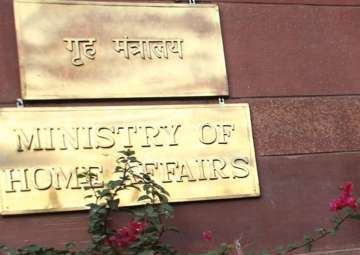MHA panel to examine rules on people's movement near Indo-Myanmar border
India's 1,643-km border with Myanmar touches four states -- Arunachal Pradesh, Nagaland, Manipur and Mizoram.

The Centre today set up an expert committee to examine the rules which allow free movement of Indian and Myanmarese citizens within 16 kms of the border, but are exploited by militants for smuggling arms, drugs, and fake Indian currency. The decision was taken at a meeting of chief ministers of the northeastern states which share a porous border with Myanmar.
Home Minister Rajnath Singh decided to constitute the committee, headed by the special secretary (Internal Security) in the Ministry of Home Affairs, which will examine the rules and regulations adopted by the border states for free movement of the people, an official release said. The committee will give its report for uniform and effective implementation of free movement regime within three months, it said.
India's 1,643-km border with Myanmar touches four states -- Arunachal Pradesh, Nagaland, Manipur and Mizoram. It is unique in many ways as it has a visa-free movement regime for people living within 16 kms on either side of the border. They can stay up to 72 hours with effective and valid permits issued by the designated authority on either side. This regime has been in place keeping in view the traditional social ties among the border people.
"However, it is misused by militants and criminals who smuggle weapons, narcotics, contraband goods and fake Indian currency notes (FICN)," the Home Minister told reporters.
Singh said that with fast improving security situation in this region, militants are denied hideouts and some of them have relocated themselves across the border.
"Taking advantage of the free-movement regime, occasionally they enter India, commit crimes and escape to their relatively safer hideouts," he said.
The committee will prepare standard operating procedures common for all the four states so that militants, criminals and contraband are filtered at the border without causing inconvenience to genuine people. The international border with Myanmar is porous with cross-border movement of insurgents and smuggling of arms and ammunition is common.
"Our government is committed to fast tracking of development in the northeastern region. Work on road and rail network extension is going on. We want to extend these networks to border areas," Singg said in his opening remarks at the meeting.
He said the region is immensely rich in human and natural resources and its ethnic and linguistic diversities enrich India's cultural heritage.
The meeting was convened to discuss the issues relating to the Indo- Myanmar border and attended by Minister of State for Home Kiren Rijiju, besides Pema Khandu, N Biren Singh and Lal Thanhawla, the chief ministers of Arunachal Pradesh, Manipur and Mizoram, respectively, and Nagaland Home Minister Yanthungo Patton.
This is for the first time that such a meeting has been called to discuss issues concerning the Myanmar border with active participation of the state governments.
Referring to the internal security situation, the home minister said although Myanmar border is peaceful and friendly, yet it is very sensitive.
Singh advised the state governments to extend cooperation in the survey work for erection, construction of subsidiary pillars for removing differences in perception of zero line and for understanding the boundary demarcation clearly. He sought cooperation of the chief ministers and the people in the region for the joint survey of border pillars on the boundary.
Singh said there are over 240 villages with over 2.5 lakh people within 10 kms of the border.
He urged upon the chief ministers to bring these areas under active policing by setting up police stations and police posts to reassure the people and also to prevent illegal cross-border activities.
Singh said a steady progress in infrastructure development has been made in the region including in inter and intra-regional road, rail and air connectivity, power, education, health and setting up of institutions of excellence and research in various fields.
The home minister said greater connectivity within the region and with the neighbours was likely to give impetus to enhanced movement of goods, services and people across the border.
Improved connectivity and relations with Myanmar were opening new opportunities of growth in the region and these would play a much greater role in near future and therefore, the Centre and the states must be adequately prepared for it, he said.